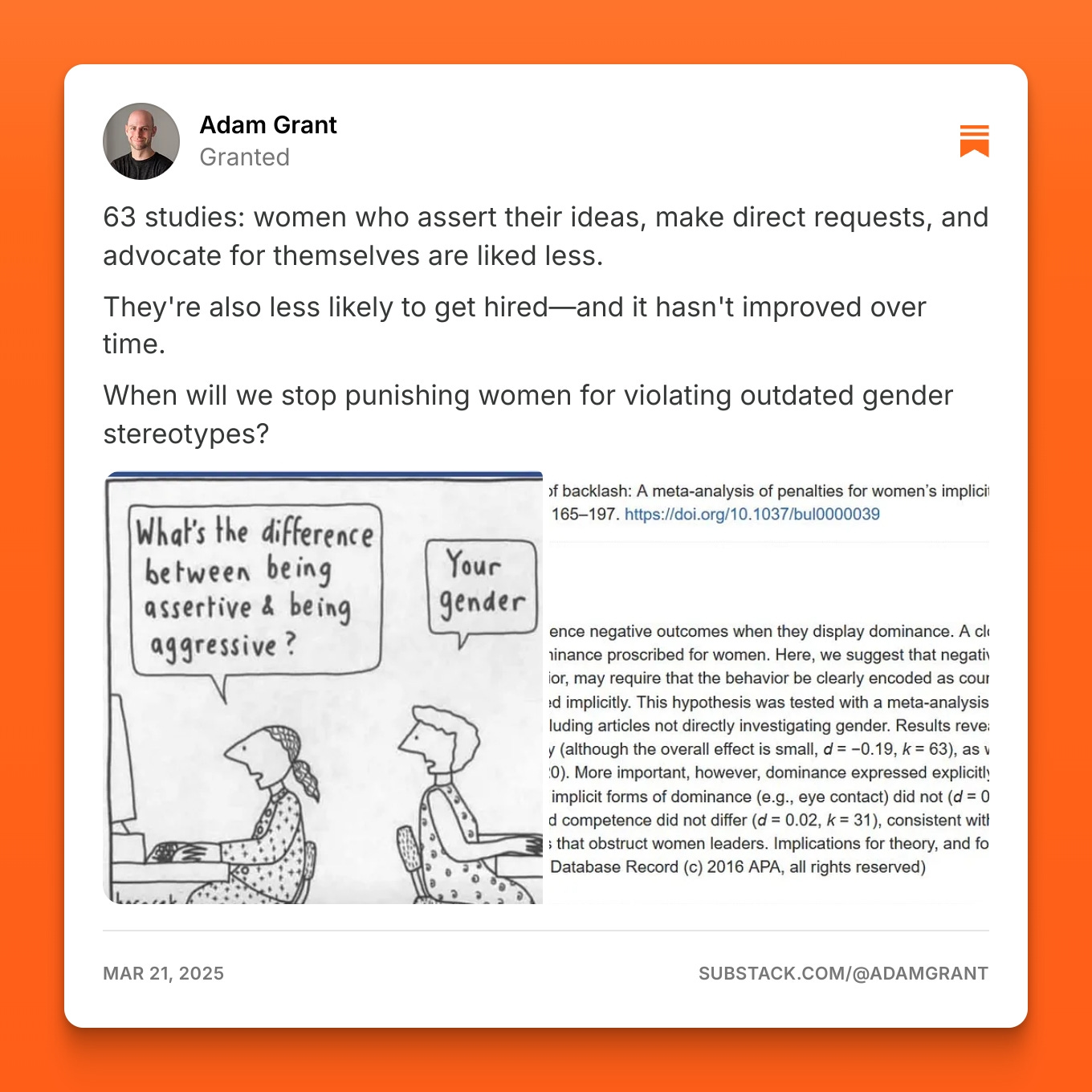Why Some Voices Still Pay a Price for Speaking Up
The invisible rules of negotiation
Welcome to The Inclusion Room — a space where literature, science, and storytelling meet to unlock the power of diversity, inspiring both personal and professional growth.
Dear Readers,
I hope this letter finds you well!
Are you a skilled negotiator, ready to stand up for your value? Or do you wait, hoping someone will notice your value?
I’m recovering from being the second type. So when I came across this Harvard Business Review article1 about why women, in general, don’t negotiate, I felt relieved. It helped me better understand my deeper patterns and gave me tools to shift my behavior.
Are men completely immune to this mechanism? Not at all.
Both men and women can fall into this dynamic—especially when they’re a minority in the room. If you're a foreigner or feel like an “outsider” in your environment, speaking up for yourself can be just as challenging.
So why is it still so hard for women, foreigners, or others on the margins to ask for what we’re worth?
Let’s dive in.
The Social Cost of Negotiating
Why women don’t negotiate? Research consistently shows that women are less likely than men to negotiate their salaries. But contrary to popular belief, according to Harvard Business Review, this isn’t due to a lack of confidence or negotiation skills. The real reason is something else: women are highly aware of the social cost.
Studies show that women’s reluctance to negotiate is an accurate read of their environment. Many intuit—correctly—that advocating for themselves, especially when it comes to salary, could put them in a socially uncomfortable position. They sense they’ll be seen as “difficult,” “demanding,” or “less likable.”
Indeed, research confirms that when women negotiate for themselves, they’re more likely than men to experience backlash. Colleagues and managers may perceive them as harder to work with, aggressive, or even rigid.
To illustrate this point, while gathering material for this article, I came across this powerful note by
.On one hand, management courses teach us to be assertive—likely to counterbalance how many of us were raised to please and accommodate. But when we actually show assertiveness, we’re often labeled as aggressive.
So it raises a real question: is it just a matter of finding the right dosage? Or is it that, culturally, we’re still not ready to accept assertiveness when it comes from women—or other perceived outsiders?
Good News: There’s a Way Through
There’s a strategy that helps reduce the social cost of negotiation. It’s called the “I-We” approach.
This technique involves framing your request in two steps:
Step 1: Make it clear why negotiating is legitimate in this context.
For example:
"You’re hiring me to lead this team. You want someone who can negotiate well—and I’m demonstrating that skill now."
Step 2: Show that you value the relationship and the bigger picture.
For instance:
"This is the only time you and I will be on opposite sides of the table. I see us as working together as a team from here on."
This strategy, grounded in research, help to achieve better results without paying the price of being perceived negatively.
You have to face the fact that you're a foreigner
The more I explored this topic, the more I realised how much the negotiation challenge it’s about being an outsider. Being a foreigner, an immigrant, someone with an accent, someone perceived as “different,” changes the whole dynamic.
Research conducted in Iceland by Kristjánsdóttir et al.2 shows that many foreigners actually perceive themselves as having less power in the negotiation. So they don’t negotiate at all. They keep quiet, accept what’s offered, and internalize the idea that “asking” might cost them more than it could bring.
Being a foreigner can often come with self-doubt. However,according to the interviews conducted for this study, working for an international organization and using English as the working language can provide a higher sense of security.
What happens at the intersection of race and gender?
Toosi and colleagues investigated how intersection of race and gender together shape negotiation behavior3.
Most research focuses on gender as a standalone category. But, as the authors write, “to focus on one of these without consideration for the influence of the other categories may lead to a limited understanding of the complexity of social phenomena”.
In real life, we’re never just one label. Intersectionality in negotiation matters.
Our identities overlap, and the way we’re seen and heard at the negotiation table depends on that intersection.
The intersection don’t just add up, but reshape each other.
The authors explain how certain identities experience “double jeopardy” (more bias from holding multiple marginalized identities), while others can become invisible, overlooked within both their racial and gender groups.
A Black woman might be labeled “aggressive” for negotiating confidently. An Asian woman might face backlash just for speaking up—seen as breaking the quiet, accommodating stereotype.
Another aspect of negotiation plays out when low-status individuals face backlash for being assertive, as such behavior is perceived as a challenge to the expected social order.
As Toosi et al. explain:
"Low-status individuals are punished for behaving in ways that are reserved for high-status individuals."
This quote captures how powerful the unwritten rules around status can be—and how they shape everyday dynamics like asking for a raise or speaking up in a meeting.
These reactions aren’t just personal impressions. They follow social scripts tied to who is allowed to be assertive—and who is not. As the authors notes:
“Certain race–gender combinations may be seen as higher status than others, and therefore better able to negotiate assertively without backlash.”
Culture shapes everything
Cultural values and norms shape patterns of expectations and backlash.
How assertive are you allowed to be? What’s considered polite or aggressive? Who is expected to speak up?
In individualistic societies, men are encouraged to be more assertive than women. In contrast, in collectivistic societies, there is higher emphasis on relational and communal behavior, women are more likely to use assertive strategies than men—because harmony is a masculine trait there.
So it’s not just what you say at the negotiation table: it’s who you are, and how others are taught to read you.
A positive climate for diversity can help reduce both the barriers and the risk of backlash that minorities and women face when deciding to negotiate.
Thanks for reading The Inclusion Room, subscribe to receive new post. I hope you enjoyed our time together, and I look forward to seeing you in the next post!





Oh Maria, being labeled simply for asserting yourself is profoundly unfair. I understand the frustration and sense of injustice it brings—especially when others aren't subjected to the same treatment. I stand with you !
This right here - "Low-status individuals are punished for behaving in ways that are reserved for high-status individuals."
It is exhausting.